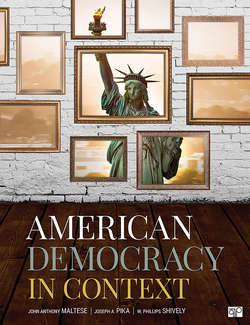Читать книгу American Democracy in Context - Joseph A. Pika - Страница 43
На сайте Литреса книга снята с продажи.
Comparative and Historical Contexts
ОглавлениеOur fundamental goal in writing this text is to help you understand how our particular form of democracy works and how it came to be. You may already know many facts about American politics—for example, about the separation of powers or the process by which a bill becomes a law. You will learn such facts from this book as well, but beyond learning what makes up American politics and government, you will also explore causes (what makes the U.S. system work as it does) and effects (what difference does that make, and why should we care?).
We chose to title our book American Democracy in Context because our main tool to help you understand American politics is to place it in a comparative and historical context. When we use comparison, we compare aspects of U.S. government and politics to those same aspects in the governments and politics of other countries. This comparative tool exposes us to possibilities beyond what we observe in the United States while offering insights into why various aspects of U.S. government and politics operate as they do. A second tool, historical analysis, allows us to investigate the roots and evolution of the U.S. system, allowing us to more knowledgeably evaluate how and why the U.S. system came to exist in its current form. The goal is to help you gain a more in-depth understanding of American democracy than you could acquire from a simple description of our politics.
As an example of how comparison and historical analysis may help us to understand American politics, consider the fact that Americans volunteer more for public purposes than people in many countries do (see Figure 1.4). In a survey of the citizens of 40 countries, U.S. citizens ranked near the top in volunteerism. When asked, for example, if they had volunteered to do charitable activities such as giving money or time or helping strangers in the last month, 62 percent of Americans responded in the affirmative.20
Description
Figure 1.4 Americans Volunteer at a High Rate
Sixty-two percent of Americans volunteered time, gave money, or helped strangers in a given month—more than the citizens of many other countries. In general, citizens of prosperous European and North American countries were more generous in this way than citizens of other countries. Why is this so?
Source: “Panorama de la Société 2014,” OECD, 2014, 153.
Why do Americans volunteer so much more readily than citizens of many other countries? Comparison may help us to some extent in answering this question. First of all, we notice from Figure 1.4 that in general, citizens of more prosperous countries tend to volunteer more than others. Of the top 10 countries in the figure, all but one are among the fifty most prosperous countries in the world; of the bottom countries, none are among the fifty most prosperous.21 Of course, there are exceptions to this tendency. Indonesia is not a prosperous country and ranks just above the United States; and France and Japan, which are prosperous, rank low on the table. Nonetheless, the tendency is a strong one. We may hypothesize that in prosperous countries, people are secure enough in their own economic situations that they can more readily spare time or money to help others.
We also notice that six of the top ten countries share a common heritage as former parts of the British Empire: the United Kingdom and its former colonies (Ireland, Canada, Australia, New Zealand, and the United States). It seems likely that there is something in the culture all of these countries share that encourages helping others.
In addition to comparison, historical analysis may help us to understand why Americans volunteer so readily to help others. Volunteering has a long-established tradition in the United States. As early as 1832, Alexis de Tocqueville, a young French aristocrat who journeyed to the United States to study how the new democracy worked, commented on how willing Americans were to work voluntarily for the common good. American society at that time was made up mostly of farming communities with a great deal of social equality, in which neighbors helped each other more or less as a matter of course. On the frontier, in fact, neighbors had to rely on each other, because the government had little presence there. The evolution of American society from these roots may have had a good deal to do with the high incidence of volunteering today.
